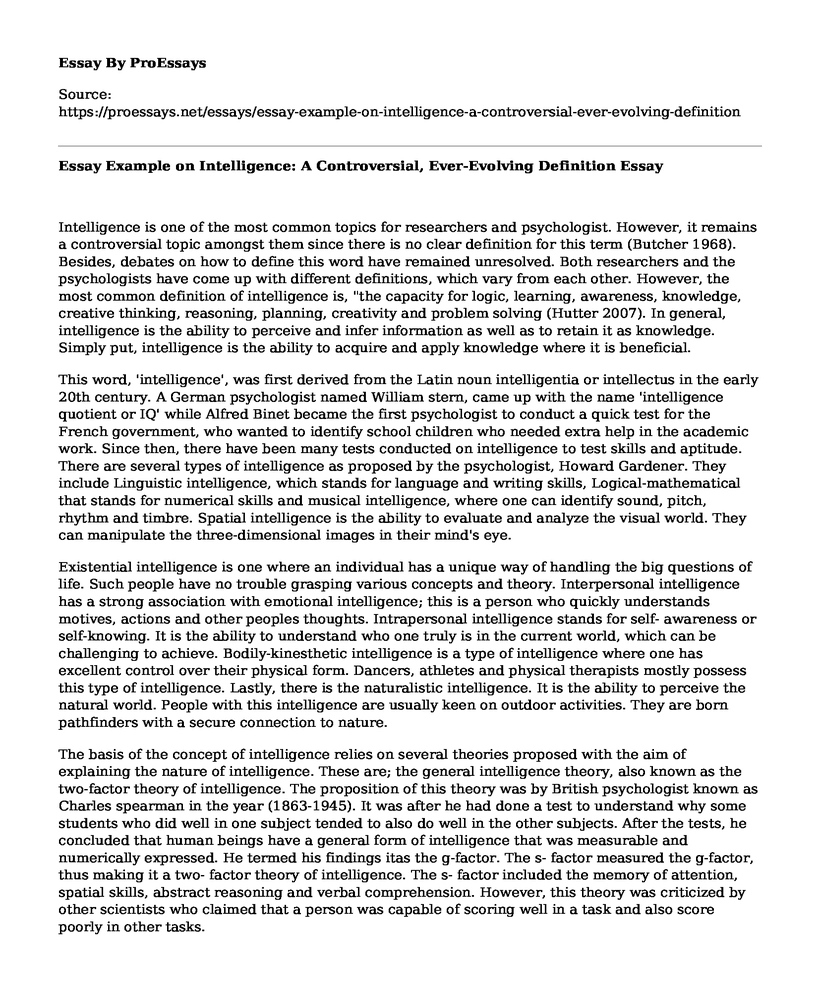Intelligence is one of the most common topics for researchers and psychologist. However, it remains a controversial topic amongst them since there is no clear definition for this term (Butcher 1968). Besides, debates on how to define this word have remained unresolved. Both researchers and the psychologists have come up with different definitions, which vary from each other. However, the most common definition of intelligence is, "the capacity for logic, learning, awareness, knowledge, creative thinking, reasoning, planning, creativity and problem solving (Hutter 2007). In general, intelligence is the ability to perceive and infer information as well as to retain it as knowledge. Simply put, intelligence is the ability to acquire and apply knowledge where it is beneficial.
This word, 'intelligence', was first derived from the Latin noun intelligentia or intellectus in the early 20th century. A German psychologist named William stern, came up with the name 'intelligence quotient or IQ' while Alfred Binet became the first psychologist to conduct a quick test for the French government, who wanted to identify school children who needed extra help in the academic work. Since then, there have been many tests conducted on intelligence to test skills and aptitude. There are several types of intelligence as proposed by the psychologist, Howard Gardener. They include Linguistic intelligence, which stands for language and writing skills, Logical-mathematical that stands for numerical skills and musical intelligence, where one can identify sound, pitch, rhythm and timbre. Spatial intelligence is the ability to evaluate and analyze the visual world. They can manipulate the three-dimensional images in their mind's eye.
Existential intelligence is one where an individual has a unique way of handling the big questions of life. Such people have no trouble grasping various concepts and theory. Interpersonal intelligence has a strong association with emotional intelligence; this is a person who quickly understands motives, actions and other peoples thoughts. Intrapersonal intelligence stands for self- awareness or self-knowing. It is the ability to understand who one truly is in the current world, which can be challenging to achieve. Bodily-kinesthetic intelligence is a type of intelligence where one has excellent control over their physical form. Dancers, athletes and physical therapists mostly possess this type of intelligence. Lastly, there is the naturalistic intelligence. It is the ability to perceive the natural world. People with this intelligence are usually keen on outdoor activities. They are born pathfinders with a secure connection to nature.
The basis of the concept of intelligence relies on several theories proposed with the aim of explaining the nature of intelligence. These are; the general intelligence theory, also known as the two-factor theory of intelligence. The proposition of this theory was by British psychologist known as Charles spearman in the year (1863-1945). It was after he had done a test to understand why some students who did well in one subject tended to also do well in the other subjects. After the tests, he concluded that human beings have a general form of intelligence that was measurable and numerically expressed. He termed his findings itas the g-factor. The s- factor measured the g-factor, thus making it a two- factor theory of intelligence. The s- factor included the memory of attention, spatial skills, abstract reasoning and verbal comprehension. However, this theory was criticized by other scientists who claimed that a person was capable of scoring well in a task and also score poorly in other tasks.
Another theory is the Triarchic theory of intelligence founded by a psychologist known as Robert Sternberg between the year 1980s to 1990s. In this theory, Sternberg states that human intelligence has three major categories. These are the analytical intelligence which involved problem-solving on own self, creative intelligence, that is the capacity to use past experiences to solve new issues and practical intelligence, which is the ability to adapt to environmental changes. Sternberg believed that these three forms of intelligence were relevant in one's life and would possibly result in success in life. He, however, criticized Gardeners theory by stating that some of the types of intelligence were individual talents.
Howard Gardener, an American psychologist, based his theory of multiple intelligence on skills and abilities that were valuable in varying cultures. As stated earlier, Gardener described eight kinds of intelligence. He believed that test scores and IQ tests were not enough to comprehend peoples abilities fully.
Conclusion
In summary, the above theories are yet to comprehend the full meaning of the word intelligence. Spearman's theory remains the most common among the three theories. However, gardeners and Sternbergs theories have a promising future.as the world evolves; these theories might change while new ones emerge.
References
Mindvalley & Mindvalley. (2020, April 29). What Are The Different Theories Of Intelligence in Psychology? Retrieved from https://blog.mindvalley.com/theories-of-intelligence/
Cherry, K. (2019, October 8). How Different Psychologists Have Evaluated Intelligence. Retrieved from https://www.verywellmind.com/theories-of-intelligence-2795035
IDSIA, S. L., Legg, S., Hutter, M., Hutter, M., Novamente LLC, & Temple University. (2007, June 1). A Collection of Definitions of Intelligence. Retrieved from https://dl.acm.org/doi/10.5555/1565455.1565458
Frames of mind: the theory of multiple intelligences. (n.d.). Retrieved from https://www.worldcat.org/title/frames-of-mind-the-theory-of-multiple-intelligences/oclc/221932479
Cite this page
Essay Example on Intelligence: A Controversial, Ever-Evolving Definition. (2023, Jul 02). Retrieved from https://proessays.net/essays/essay-example-on-intelligence-a-controversial-ever-evolving-definition
If you are the original author of this essay and no longer wish to have it published on the ProEssays website, please click below to request its removal:
- Student Activism in the Creation of Laws and Policies Essay
- Essay Sample on Role of Friendship in Learning and Acquiring English
- The Negative Effect of Divorce Parents on Child Physics - Essay Sample
- The Characteristics of Expert Teachers Paper Example
- Breaking the Surface by Greg Louganis Essay Example
- Essay Sample on Learning from Life: An Unforgettable Experience in Unit
- Educational Beliefs and Practices Reflection







